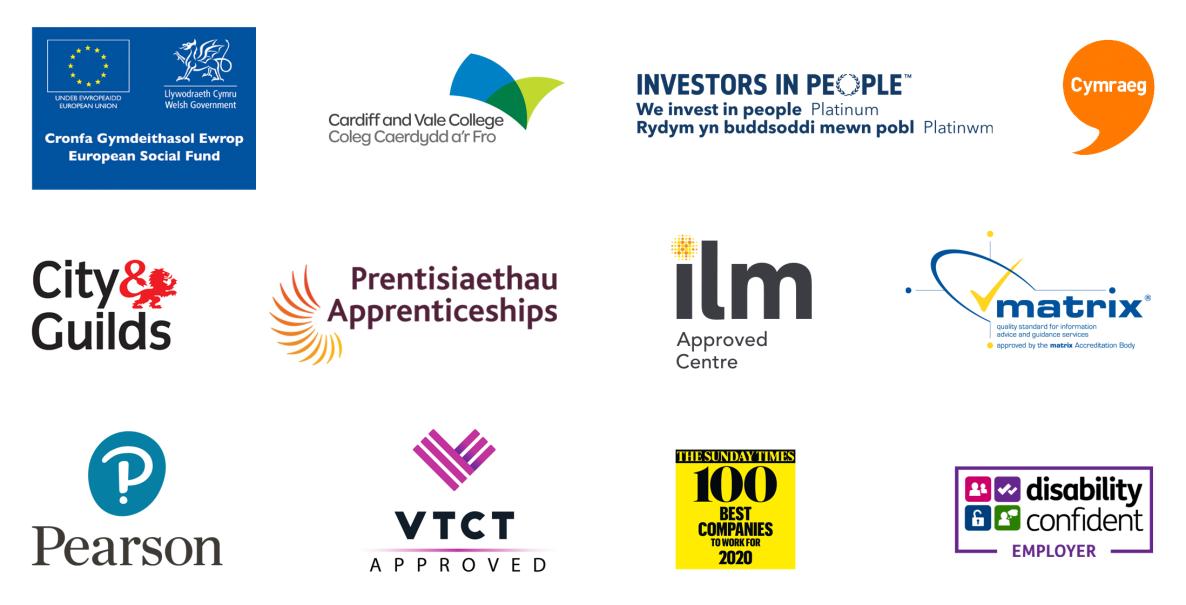

Health and Social Care -
Adults
Level 2
Level 2 Foundation Apprenticeship
Health and Social Care; Adults
The Health and Social Care Foundation apprenticeship covers many key aspects of supporting the health and care needs of adults. With a focus of understanding and demonstrating the key principles within the sector to raise the quality and standards in care.
Contents




Apprenticeship Framework
Level 2 Foundation Apprenticeship in Health and Social Care; Adults
Essential Skills Qualifications
Welsh Language Development


Apprenticeship Framework
The aim of the Health and Social Care foundation apprenticeship is to provide learners with the skills and knowledge needed to progress into roles within the Health and Social Care Sector. It will enable the learners to apply for registration with Social Care Wales.
For more information, please visit: https://socialcare.wales/registration
The programme prepares learners for:
• Individuals aged 16+ currently working in or intending to work in the health and social care sector
• social care worker (adults)
• healthcare support worker
• healthcare assistant.
Who is this foundation apprenticeship for?
This programme is for individuals who are currently working in the health and social care sector who require the qualification for Social Care Wales purposes. It is suitable for;
• Learners who are employed in the Healthcare and Social Care Sectors
• Learners returning to the work place after a career break looking to refresh their knowledge and skills
• Learners who have completed the Level 2 Health and Social Care: Principles and Contexts (Adults) qualification
Overview
The qualification will provide a thorough introduction to the principles, values and knowledge needed to work in the healthcare sector with adults. The content for this qualification supports learners to develop their knowledge, understanding and practical skills of:
• The core principles and values which underpin health and social care practice
• Ways of working in the health and social care sectors
• Effective practice within the health and social care
• Progression routes to further study or employment within Health and Social Care safeguarding.
On completion of this foundation apprenticeship, you will achieve the following:
• City and Guilds Level 2 Health and Social Care: Core
• City and Guilds Level 2 Health and Social Care: Practice
• Level 1 Essential Skills: Communication
• Level 1 Essential Skills: Application of Number
• Prentis-Iaith Welsh Language Development
On the following pages, you will find information relating to the main qualification (Level 2 Health and Social Care), as well as other aspects that will make up this apprenticeship programme, including Essential Skills and Welsh Language Development.

Level 2 Health and Social Care; Adults
Length of time to complete
We will tailor your learning programme to suit your needs, so that each learner’s experience is unique. While learner’s needs will be different, the recommended time to complete this programme is 18 months
Course Delivery
This qualification is divided into two components:
1. The Core qualification
2. The Practice qualification.
These will both be delivered through a mixture of online remote learning sessions and 1-to-1 sessions with tutors and an assessor. The online sessions will take place once or twice a month which could be between one to three hours long:
Core Practice
• 5 x workshops of three hours long
• 5 x workshop reflections
• 5 x mini sample multiple choice tests
• 1 x sample full-length multiple-choice test
• 1 x live multiple-choice Assessment (1hour 45mins)
• 1 x portfolio of evidence
• 1 x ready for assessment observation
• A number of in-depth reflective accounts
• 4 x observation plans
• 4 x live observations
• 4 x reflective reviews
• 1 x 20-minute professional discussion
Learners will also be set tasks to complete between each visit, for approximately 20 hours per month (please note – this is just a guide and will vary based on learner needs).
Course delivery plan: Core 0 – 6 months
1
2
3
4
5
• Attend IALP session, induction and book in for all workshops 120 minutes
• Attend workshop on Principles and Values (Unit 001)
• Complete the workshop reflection following this workshop
• Sit sample Multiple choice test
• Attend workshop on Health and well-being (Unit 003)
• Complete the workshop reflection following this workshop
• Sit sample Multiple choice test
• Attend workshop on Professional practice (Unit 005)
• Complete the workshop reflection following this workshop
• Sit sample Multiple choice test
• Attend workshops on Safeguarding individuals (Unit 006), and Health and Safety (Unit 007)
• Complete the workshop reflection following this workshop
• Sit sample Multiple choice test
• Complete mock test and plan for readiness for assessment observation.
6
• Attend live test for the core
• Assessor will complete RFA observation in the workplace.
For any learners who have completed the All-Wales Induction Framework (AWIF); it will be the assessor’s responsibility to cross-reference into the learner’s portfolio but learners must provide the evidence. Assessor’s will expect the learners to complete a reflection of learning and discussion against the AWIF before making a judgment on whether the learner is ‘test ready’.
Course delivery plan: Practice 7 – 18 months
7
8
• Review IaLP with assessor and learner to independently complete a reflective log for the practice qualification
• Learner should have had an RFA completed by this point, the assessor will confirm the learner’s readiness for assessment with the manager
• Learner will need to select the units to meet the credit value that is applicable to their role and responsibilities
• Work product will be discussed for the portfolio of evidence ready to be gathered.
• Learner will start planning their live observations (Task B) assessor to prepare the learner but the learner will need to do this independently
• 1st Live observation (task C) to be carried out and uploaded to one file
• Work product to be gathered and discussed with the assessor
• Review with assessor and learner to independently complete a reflective log for the practice qualification
9 • First live observation to be discussed with the learner and the learner should then complete the reflective review independently (Task D)
• If not done further observation planning will be needed to be undertaken for 2nd Obs.
10
• Assessor to carry out second live observation (Task C)
• Work product to be gathered and discussed with the assessor
• Review with assessor and learner to independently complete a reflective log for the practice qualification
minutes
minutes
11
• Second live observation to be discussed with the learner and the learner should then complete the reflective review independently (Task D)
• Review with assessor and learner to independently complete a reflective log for the practice qualification
• If not done further observation planning will be needed to be undertaken for 3rd Obs.
12
• Assessor to carry out the third live observation (Task C)
• Review with assessor and learner to independently complete a reflective log for the practice qualification
13
14
15
• Third live observation to be discussed with the learner and the learner should then complete the reflective review independently (Task D)
• Review with assessor and learner to independently complete a reflective log for the practice qualification
• If not done further observation planning will be needed to be undertaken for 4th Obs.
16
• Assessor to carry out the final live observation (Task C)
• Review with assessor and learner to independently complete a reflective log for the practice qualification
• Final live observation to be discussed with the learner and the learner should then complete the reflective review independently (Task D)
• Work product to be gathered and discussed with the assessor
• Review with assessor and learner to independently complete a reflective log for the practice qualification
• Professional discussion to be planned with the learner and learner to be given a full plan to prepare for
minutes
Month Knowledge activity
• Discussion will take place this month lasting a minimum of 20minutes
17 • The portfolio will be submitted for final quality checks
18
• Any actions from the quality check to be completed and resubmitted for claim
60 minutes
What you will learn
To achieve the Level 2 qualification, all learners must achieve the mandatory unit (14 credits) as well as a minimum of 14 credits from Group A and the remaining 7 credits from either Group A or Group B.
Mandatory Unit
• Supporting core practice in Health and Social Care (Adults)
Optional units Group A*
• Contributing to the care and support of individuals living at home
• Providing care and support for individuals living in care home settings
• Contributing to the support of individuals living with dementia
• Contributing to the support of individuals with the use of electronic assistive technology
• Promoting support for individuals with a learning disability and/or autism
• Contributing to the support of individuals who misuse substances
• Promoting positive approaches for behaviour support
• Supporting individuals with a physical impairment
Optional units Group B*
• Supporting individuals with moving and positioning
• Supporting individuals to maintain mobility and minimise the risk of falls
• Supporting the use of medication in social care settings
• Supporting individuals with sensory loss
• Supporting food safety practice in health and social care settings
• Supporting individuals to manage pain and discomfort
• Supporting nutrition and hydration for individuals with special dietary requirements
• Supporting individuals with management of continence
* During the first visit/meeting, our assessors’ will work with all learners and employers to review which of the optional units are the most appropriate for your programme.
Workshops
We run a series of workshops that will help develop the knowledge needed for your programme for the Core with our Tutor. These workshops are mainly delivered remotely via Microsoft Teams, however face to face workshops can be arranged to suit the needs of individual learners.
An assessor will book the learners onto the workshops throughout the learner’s progress – learners are not required to attend a full week of training in one go; learners would be expected to attend one per month.
Principles and Values
This workshop will ensure that learners gain knowledge of how legislation, national policies, guidelines and frameworks support health and social care provision for adults. Learners will understand the need to promote equality and diversity and how person centred and rightsbased approaches relate to health and social care including how appropriate risk-taking supports well-being voice, choice and control. Learners will appreciate the importance of effective communication, including the role of Welsh language and culture, in supporting health and social care provision and how periods of change and transition can impact on individuals. Understanding will be gained of how to develop positive relationships with individuals within professional boundaries and approaches that support positive behaviour including how learners’ own beliefs, values and life experiences can affect attitude and behaviour towards others.
Health and well-being
This workshop will ensure that learners gain knowledge of factors that may affect the health and well-being of individuals. This will include understanding of the links between good physical health and mental health, and how these can be impacted by different factors such as physical activity and self-identity. Knowledge will be gained of the importance and ways of ensuring appropriate personal care for individuals. This includes pressure area care, mouth care, foot care and continence care. Learners will understand the importance of nutrition and hydration including government guidelines. Learners will understand responsibilities, legislation and guidelines and their importance in the administration of medication.
Professional Practice
This workshop will ensure that learners understand their job role, responsibilities including duty of care, accountabilities and standards of professional behaviour. Learners will understand codes of conduct, professionalism, policies and procedures including confidentiality, the limitations of their role and responsibilities and when to seek additional support to deal with situations beyond their job role or conflicts and dilemmas. Learners will gain knowledge of partnership working, the importance and ways of effective team and multiagency working. Learners will cover how to handle, store and record information following legislation and codes of conduct. Learners will understand the importance of continual professional development and reflection to improve practice.
Safeguarding
Learners will understand the terms safeguarding and categories and signs and symptoms of abuse and neglect. Knowledge will be gained of legislation and national policies and codes of conduct in relation to safeguarding, the roles of different agencies and recording and reporting procedures where abuse is indicated. The learner will know and understand their responsibilities in relation to safeguarding including the role of advocacy, appropriate relationships and person/child centred practices. The learner will cover ways of responding, recording and reporting procedures to follow including an understanding of ‘whistleblowing’ and boundaries of confidentiality.
Health and Safety
Learners will understand how health and safety legislation impacts on daily practice, their role and responsibilities and those of employers. Learners will cover the types of accidents, emergencies and hazards that may occur in a workplace/setting and how risk assessment is used to support health and safety. Learners will understand responsibilities in relation to carrying out, recording and following risk assessments and the importance of reporting and recording health and safety concerns and incidents. Knowledge will be gained of legislation relating to fire safety, moving and handling, infection control, food safety, waste disposal and security with understanding of relevant safe good practices and procedures. Learners will know signs of stress, circumstances that may cause stress and actions that can be taken to reduce and manage stress including support available.
Have any questions about our Level 2 Diploma in Health and Social Care
We are here to help. If you have any further questions or enquiries about the main qualification element of the programme, please contact our Route Manager:
Hannah Piles
Route Manager for Health and Social care
hannahpiles@acttraining.org.uk

Essential Skills Qualifications
When you agree to undertake an apprenticeship, you may be required to complete Essential Skills as part of your apprenticeship framework.
What are Essential Skills?
The Essential Skills Wales (ESW) will be initially assessed via an online Wales Essential Skills Toolkit (WEST) Assessment. If a Learner already holds an ESW certificate or equivalent qualification this can provide a proxy and learners will not need to complete that ESW element of the programme. Where a Learner is not exempt an Individual Learning Plan (ILP) will be generated from the initial WEST assessment. The modules delivery will include independent learning via WEST, prior to guided learning sessions preparing the Learner for their assessment. ESWs are assessed via controlled tasks and confirmatory tests for Communication and Application of Number, Digital Literacy is assessed via a controlled task and structured discussion.
Proxy
If you already hold qualifications, these may be used as ‘proxy’ towards your apprenticeship framework. As a result, you will be exempt from achieving that particular Essential Skill, if you wish. This will be discussed with you before you sign up. Below are some examples, although this list is not exhaustive.

Welsh Language Development
As part of your Welsh Government funded framework, you will be supported to develop and maintain your Welsh language skills for the workplace.
What is Welsh Language Development?
ACT are committed to playing their part in the Welsh Government Million Speakers strategy. All learners will complete the Prentis-Iaith Welsh Language Development course as part of your framework with us.
Don’t panic – this is as a means of development and is aimed to support you with the development of your Welsh Language skills. This course is specially designed to give apprentices a basic knowledge of Welsh for the workplace and consists of 6 interactive modules to complete online. The course will be completed throughout your framework, with support from your assessor.
Already bilingual?
If you are Welsh speaking, you will be able to undertake your learning bilingually. In practice this means that you can choose the elements of your learning that you would like to complete through the medium of Welsh. You will be able to discuss your particular preferences with your assessor.
